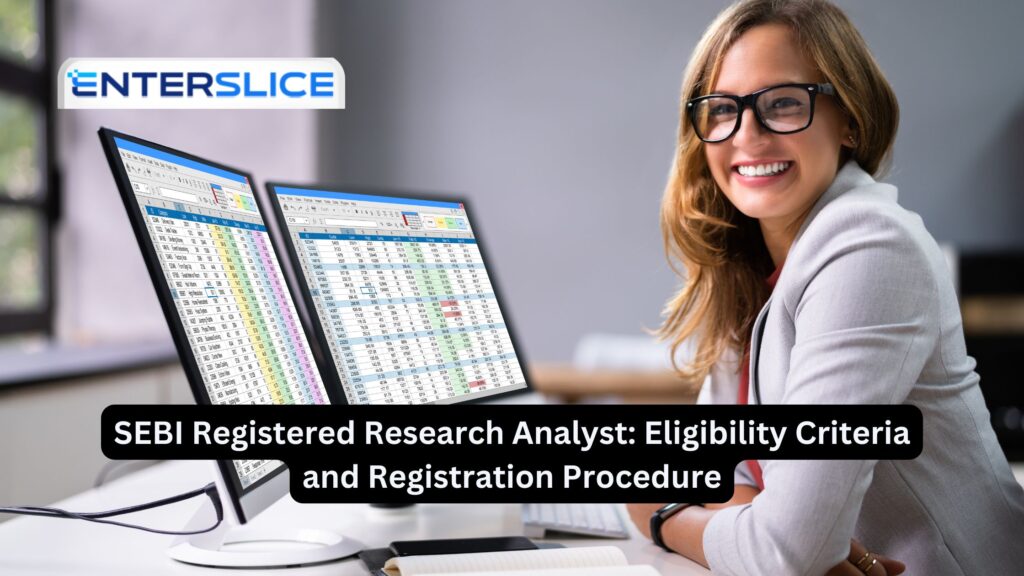Are you looking to become a SEBI Registered Research Analyst and build a successful career in the financial markets? Becoming a SEBI registered research analyst is an excellent way to establish credibility, gain trust in the industry, and provide valuable insights into the stock market. However, before you can begin this journey, there are specific eligibility criteria and a detailed registration process that you need to follow.
In this blog, we will break down the eligibility criteria and registration procedure for becoming a SEBI registered research analyst in a way that’s easy to understand, providing clear steps on how you can start your career as a professional analyst in India.
What is a SEBI Registered Research Analyst?
A SEBI Registered Research Analyst is an individual who has been authorized by the Securities and Exchange Board of India (SEBI) to provide investment research and analysis. Research analysts play a critical role in helping investors make informed decisions by offering detailed research on financial markets, securities, and investment opportunities.
In India, SEBI is the regulatory body that governs and supervises the securities and commodities market. SEBI ensures that only qualified professionals provide market research, ensuring that the advice and analysis provided to investors are credible and trustworthy.
Why is SEBI Registration Important for Research Analysts?
To operate legally in India as a research analyst, you need to be SEBI registered. Without this registration, you are not allowed to offer research services, analysis, or recommendations related to securities to the public. Becoming a SEBI Registered Research Analyst brings multiple advantages:
- Legal Authorization: SEBI registration gives you the legal authority to offer research and analysis services.
- Credibility: Being SEBI registered adds credibility to your work, which helps build trust with clients and investors.
- Career Growth: As a SEBI-registered research analyst, you can access a wide range of job opportunities with financial institutions, brokerages, and wealth management firms.
- Client Confidence: Investors and traders are more likely to trust a SEBI-registered professional, as it shows you meet the regulatory standards and ethical guidelines set by SEBI.
SEBI Registered Research Analyst: Eligibility Criteria
Before you apply for SEBI registration, it is essential to understand the eligibility criteria set by SEBI. These criteria are in place to ensure that only qualified professionals provide analysis and recommendations to the public.
1. Educational Qualifications
To become a SEBI Registered Research Analyst, you need to meet the following educational qualifications:
-
A Graduate Degree: You must have a bachelor’s degree in any discipline from a recognized university. This could be in finance, commerce, economics, or any other relevant field.
-
Post-Graduate Qualification (Optional): A postgraduate degree in finance, economics, or business administration can be advantageous, though it is not mandatory.
-
NISM Certification: One of the key requirements for SEBI registration is obtaining the National Institute of Securities Markets (NISM) Certification for research analysts. This certification ensures that you have the necessary skills and knowledge to provide investment research. You must pass the NISM Series-X-A: Research Analyst Certification Examination to be eligible for registration.
2. Work Experience
You must have relevant experience in the financial markets. This includes a minimum of 5 years of work experience in financial analysis, research, or a related field. The experience could be gained through roles in investment banking, financial analysis, portfolio management, or any other related sector.
3. Fit and Proper Criteria
SEBI mandates that all individuals applying for research analyst registration must meet the “fit and proper” criteria. This ensures that the individual has a clean legal and financial record. You should not have any previous criminal convictions or have been involved in financial fraud or market misconduct.
4. No Conflicts of Interest
Research analysts must maintain objectivity in their work. SEBI requires that registered analysts do not have conflicts of interest while providing research services. For example, you cannot provide analysis or recommendations on securities that you personally hold or have financial interests in.
SEBI Registered Research Analyst: Registration Procedure
Once you meet the eligibility criteria, you can apply for SEBI Registered Research Analyst status. The registration process involves the following steps:
1. Step 1: Complete the NISM Certification Exam
As mentioned earlier, the first step is to pass the NISM Series-X-A Research Analyst Certification Examination. The exam covers various aspects of securities markets, research analysis, financial instruments, and regulatory practices. It is essential to prepare thoroughly for this exam, as it is a key requirement for SEBI registration.
2. Step 2: Prepare Required Documents
After passing the NISM exam, you need to prepare and submit several documents as part of the registration process. Some of the required documents include:
- Proof of educational qualifications (degree certificate)
- Proof of work experience in the financial sector
- Identity proof (Aadhaar card, passport, etc.)
- Proof of address
- Details of any financial interests or conflicts, if applicable
3. Step 3: Submit Application to SEBI
Once all documents are ready, you need to submit your application to SEBI along with the required fees. The application form can be filled out online through SEBI’s official website. Ensure that all information is accurate and complete to avoid delays in the registration process.
4. Step 4: SEBI Verification
SEBI will review your application, verify your documents, and ensure that you meet all the eligibility criteria. If everything is in order, SEBI will approve your registration.
5. Step 5: Registration and Certification
Upon successful approval, SEBI will issue your SEBI Registered Research Analyst certification. You can now legally provide research and analysis services in the Indian securities market.
SEBI Registered Research Analyst: Fees
The registration process with SEBI requires the payment of certain fees. These fees include:
- Application Fee: SEBI charges an application fee for registration. The fee can vary depending on the type of registration.
- Renewal Fee: SEBI registration is valid for a specific period (usually 3 years), after which you will need to renew your registration by paying the renewal fee.
It is essential to check the latest fee structure on SEBI’s official website or consult with a legal professional for the most accurate and up-to-date information.
Conclusion
Becoming a SEBI Registered Research Analyst is a great career move for anyone passionate about financial markets, securities, and investment analysis. By meeting the eligibility criteria and following the registration procedure, you can gain the necessary credentials to work as a professional research analyst in India.
SEBI’s rigorous standards ensure that only qualified individuals provide valuable insights to investors. By obtaining this certification, you enhance your career prospects, build trust with clients, and establish yourself as a credible professional in the financial industry.
FAQs
1. How long does it take to get SEBI Registered Research Analyst certification?
The process typically takes 2-3 months, depending on the time it takes to complete the NISM exam, submit your application, and SEBI’s processing time.
2. Can I apply for SEBI registration if I don’t have a post-graduate degree?
Yes, you can still apply with a bachelor’s degree, but having a post-graduate degree in a relevant field can be an added advantage.
3. Is the NISM certification exam mandatory for all research analysts?
Yes, passing the NISM Series-X-A Research Analyst Certification Exam is mandatory for all individuals wishing to register as SEBI Research Analysts in India.
Also, read:
What Documents are needed for Registration of Mutual Funds with SEBI?






